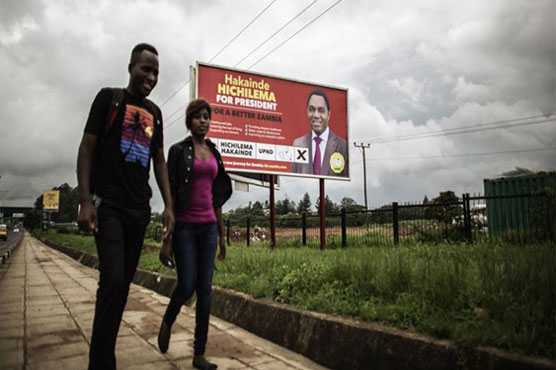Rainstorms mar Zambia's presidential vote

Fifty-two-year-old Hichilema is seen as the main challenger to Defence Minister Edgar Lungu
LUSAKA (AFP) - Heavy rains on Tuesday held up the start of voting in parts of Zambia, where a close-fought presidential election was under way to replace Michael Sata, who died in office last year.
Election authorities said voting failed to take place in some remote parts of the country after downpours rendered them inaccessible.
"A number of polling stations will start tomorrow (Wednesday)," elections director Priscilla Isaacs said late Tuesday.
Material for more than 140 polling stations and some 1,500 polling officers were to have been airlifted to villages cut off by the rains Tuesday.
But not all materials and staff could be moved as "extreme thunderstorms" grounded the flights.
Voters in at least two dozen out of around 6,000 polling stations are expected to cast ballots on Wednesday.
The delay in the delivery of polling material led a frontrunner in the vote, opposition candidate Hakainde Hichilema of the United Party for National Development (UPND), to cry foul.
"Why are there no ballot papers in our strongholds? Someone is scheming around. It s fraud," Hakainde told reporters after casting his ballot in Lusaka.
Fifty-two-year-old Hichilema is seen as the main challenger to Defence Minister Edgar Lungu, 58, who represents the ruling Patriotic Front (PF).
Cannot control the weather
"We have no control over the weather," Isaacs said.
The first counts were expected to begin trickling in overnight, while the final results were to be released by Friday.
The interim vote was triggered after Sata died in October last year from an undisclosed illness.
At stake is the remaining year and a half of his five-year term in the copper-rich southern African nation.
Despite scheduled elections also due next year, Zambians braved rains and chilly temperatures in long queues to cast their votes. Observers suggested a low voter turnout could be blamed partly on the weather.
The rivals -- Lungu the lawyer and Hichilema the economist, known as HH -- both drew huge crowds at their final rallies.
But in the absence of reliable opinion polls, analysts hedged their bets.
"It s a two-horse race," said Oliver Saasa, CEO of Premier Consult, a business and economic consultancy firm. "It s quite clear this is a very closely run race."
"My vote is going to make a difference, we are going to remove this...(PF) family," said 55-year-old vegetable vendor Matron Siyasiya. "They can claim all the good work, but God s favour is on my candidate, and that is HH."
Grace Nyirongo, who runs a takeaway food business, said she was satisfied with the government and echoed the ruling PF s campaign slogan of continuity.
"We want the government to continue with the projects started by Sata. Frankly there s no need to start afresh," Nyirongo said.
The rains, which also pounded Lusaka did not deter voters in the Zambian capital.
Many lined up in rain-drenched clothes, wading through mud or puddles to cast their ballots.
Hichilema s camp is seen to have received a boost from the infighting within another major opposition party, the Movement for Multiparty Democracy (MMD), whose candidate Nevers Mumba has little chance.
Lungu s PF, meanwhile, went into the vote badly fractured by a bitter power struggle after Sata s death in October.
Two opposing camps -- one led by Lungu and another by interim president Guy Scott -- nominated rival presidential candidates.
After many weeks of mud-slinging, Lungu emerged as the sole candidate -- but of a weakened party.
Scott, Africa s first white leader in 20 years, cannot stand for the presidency himself as his parents were not born in Zambia.
With ideological differences between Zambia s political parties difficult to pin down, voting patterns are often determined by personalities and ethnicity rather than issues.
Despite growth-oriented policies and a stable economy over the past few years, at least 60 percent of Zambia s population of 15 million lives below the poverty line, according to World Bank figures.
About 5.2 million people are eligible to vote.


